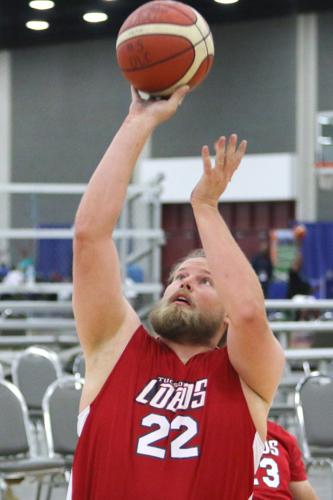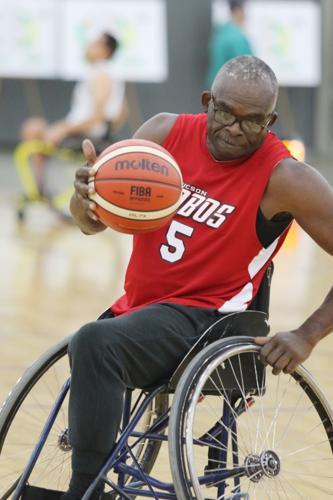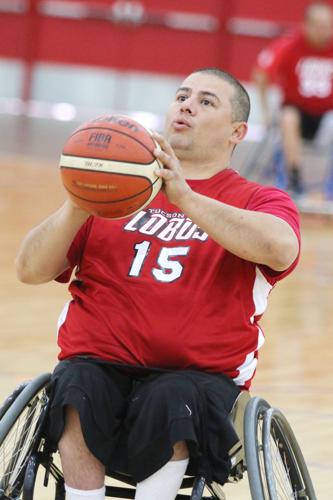They stuck around hoping to get up a few more shots, to get out on one last fast break for the year, to work up that final good sweat of the season. Really, they just didn’t want to leave the court.
The Tucson Lobos Wheelchair Basketball team had become so much to them, in such short a time, that this couldn’t be it, could it?
But they’d eaten the last of the pizza, and handed out the last of the team spirit awards — on a squad like this, team manager Mia Hansen says, the field for Most Inspirational Player goes three deep — and they’d put a nice little bow on one important season.
Just months ago, the team was on the verge of folding; two veteran members who served as organizers and coaches had moved away from the state in the previous months, and there was only a half-dozen or so left with any interest.
Hansen, a local community organizer and past president of the Festivals and Events Association of Tucson, was already a volunteer for the team, but she offered to give even more time. Within weeks, morale changed, friends reached out to friends, loaner wheelchairs gave first-timers an opportunity to play, and before they knew it, the Lobos were up to 20 players.
They would start the season ranked 35th out of 53 teams in their division and finish it ranked 18th, a drastic improvement, and a cause for both celebration and disappointment, as only the top 16 teams were invited to the National Wheelchair Basketball Tournament in Louisville.
Hansen saw the sunken shoulders. March Madness meets March sadness. And yet, there was genuine enthusiasm for next season, and a renewed hope for the Lobos team members, both on and off the court.
Walking out to the parking lot that night, Hansen was pleased with how everyone had come together, and for the future.
Then she got a phone call.
It was the National Wheelchair Basketball Association, calling to tell Hansen that two teams could not commit to the tournament, with an invitation for the Lobos to join the field.
“A few of us had stayed behind to play just a little more basketball together, and Mia comes running back in, ‘I just got off the phone with Buddy Barnes!’” first-year Lobos center Karl Yares said. “I knew what was going on right then. I was tingling.”
There would be more basketball.
“They were so excited,” Hansen said. “Literally flipping out — one kid got excited and did a roll with his chair.”
•••
If you think the Cinderella story ends there, well, you’re right.
The Lobos traveled to Kentucky on Wednesday and played — and lost — two games on Thursday before dropping another game on Friday morning. They finished the tournament Saturday with a 2-2 record, good for 11th.
But if you think some tournament in the middle of America is going to determine the fate of this group, you’ve got another thing coming.
Cinderella already has her glass slippers, even if it’s only one.
“This has been huge for me. I was missing this,” said Yares, 30, whose left leg was partially amputated after a car accident last year. “Being in a hospital bed for a month, trying to build back strength, trying to figure out how to be a one-legged guy. … And just to find a group of people who you know have been through at least a similar experience and in some cases much more difficult. There’s a lot of strong people here.”
The team was started about 10 years ago, but maintaining a thriving club sport proved difficult. The team was primarily made up of former UA wheelchair basketball players and members of a Sierra Vista club team that had dissipated. By the beginning of the season, however, things were looking bleak.
Arthur Parson, a 63-year old Army veteran with experience in more than a dozen National Veterans Wheelchair Games, volunteered to coach. He’d been heavily involved with the team in Sierra Vista, where he lives, and he loved coming up to Tucson just for the exercise and camaraderie of it.
Parson had gotten his start in wheelchair basketball with the Arizona Wildcats program in the mid-1980s; during his stint in the Army, he developed bone cancer, which required the amputation of his right leg in 1976. Wheelchair basketball became a passion for Parson, who is also a preacher.
“It gives me an opportunity to meet so many people with disabilities, to figure out how they get around, how they see things, how they deal with life,” he said. “I’m a religious person, an ordained preacher, and I get the opportunity to speak with guys about their lives, and their spirituality. It’s important for them to know that someone loves the lord and really cares about them.”
In the Sierra Vista Herald, Parson was given one terrific nickname.
The Godfather of Roll.
And if anybody needed to hear the gospel according to the Godfather, it was Tony Sanchez.
•••
At age 22, Sanchez was an overnight supervisor at Walmart, living in Avondale. This was 2001.
He says he never drank or drove, but one night, he said, “For some dumb reason, I decided to get behind the wheel drunk.”
He was headed home early one morning, lost control of his vehicle and hit a truck from behind. The car flipped several times, and Sanchez was left with a broken spinal cord.
The driver of the other truck lost control and hit a pole. He was killed instantly.
Sanchez was arrested and charged with manslaughter and given a sentence of nine years, nine months. He served eight years, five months, then was released on parole.
In many ways, this was a life sentence. Sanchez lost his wife, his mobility, his autonomy.
Worse, even.
“The worst part of it … I ended someone’s life,” he said. “I didn’t know that person. That still lives with me every day. It’s hard to live with that in the back of your mind. But I live for my kids. I watch them grow up, and I teach them the dangers, and I try to get my story out. From one day to the next, your life can change completely.”
Released from prison in December 2010, Sanchez was aimless. The Tucson High graduate had purpose in his life — to raise his two kids — but not much direction.
Mentally, emotionally, spiritually, he was losing the battle.
In 2014, he’d had enough. Sanchez, 37, reached out to the Arizona Spinal Cord Injury Association, and a woman in Phoenix referred him to Pete Hughes, who played for the Lobos.
“Other than my kids, I had nothing to do, and since I’ve been introduced to the sport, I have another purpose for my life,” he said. “The wind hitting my face, being part of a team. I played baseball in the lower leagues, and it was great playing for a team. Twenty years later, to start playing with this team, it’s almost a religious experience.”
•••
Mia Hansen is floored.
“This is amazing,” she says, surveying a moving tapestry of taped-up hands and spinning wheels, 16 courts in all, taking over the Kentucky Exposition Center. “Seeing our team take the court, to be a part of this tournament — I got teared up.”
She knows what this can do for someone.
“It’s life-changing for them, and for me,” she said. “It is reaffirming my belief in the power of sports. I grew up playing sports in a small town in Oregon … and so did my brother.”
She pauses.
“Throughout our life, we played sports, and then my brother dove into a river and broke his neck and became a quadriplegic at the age of 21.”
Mark Hansen became an avid wheelchair rugby player and advocate for wheelchair athletics, and, his sister said, “He was such a wonderful inspiration for me, and that’s the main reason I do this. I saw him go from the total depths of depression, my life is over, to having something to grab on to.”
Speaking by phone from Louisville on Wednesday, when she traveled ahead of the team to set things up, she marveled.
“Pulling into the hotel, there were wheelchairs everywhere and people with every sort of ability you can imagine. … For so many of our players, this is bigger than life. They’re wanting — needing — somewhere to socialize and to be together.”
•••
For men like Yares and Sanchez, there may be nothing more important.
“It’s been an awesome ride actually,” Sanchez said. “It looked like it was going to fall apart, and Mia stepped in, a lot of team members started recruiting people, and everyone loved it. Next year, we’re hoping to get two teams going. It’s a really exciting time.”
Sanchez has been so inspired by his new life that he has become a founding board member for Southern Arizona Adaptive Sports. He hopes to get a grant to go back to school, and one day work with people struggling with this kind of transition.
“You think you’re alone in this world, but there’s a lot of people with your story,” he said.
Yares echoed the sentiments.
“It’s been an absolute tornado,” he said. “I started the year with a loaner chair, and it was hard pushing, and when we went to our first tournament in Phoenix, we were pretty ragged. The progress we’ve made, it is astounding. We’re a different team than we were in October.”
To think, just months ago, he was walking around the Pima College campus on crutches, his spirits needing crutches themselves. A team member, Shane Rodabaugh, approached him out of nowhere.
Now Yares sees a different future ahead. A complete future.
“In a way, it makes you feel whole again,” he said. “It kind of makes you feel powerful, to be part of a group, with a singular goal. We get mad at each other, scream at each other, and then we just try to do better. When things go well, we definitely congratulate each other, too. This, you don’t feel so confined.
“It really does make you feel whole.”






